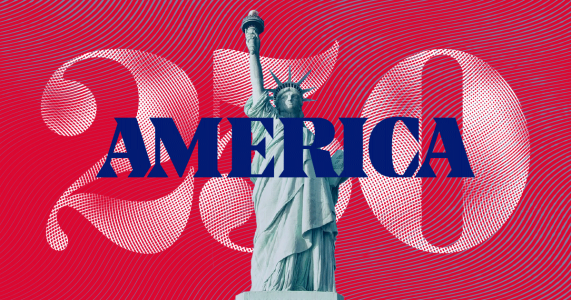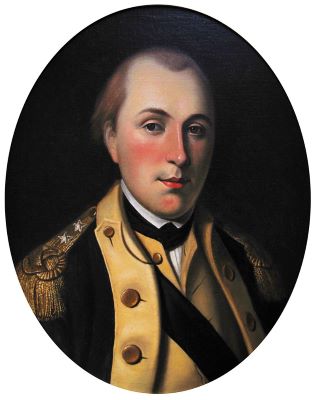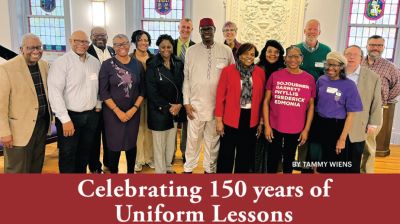
Joe Biden campaigned as the unity President, the President of all Americans. The words sound good and are in marked contrast to his predecessor who thrived on divisiveness. Nonetheless, while it is easy to talk the talk of national unity, it is hard to walk the walk of it. The challenge is especially strong given the narrow election victory. For the past four years we have heard how if only a few voters in Michigan, Wisconsin, and Pennsylvania had switched votes (or stayed home), the election results would have been reversed. We can anticipate hearing a similar claim about the votes in Arizona, Georgia, Nevada, and Pennsylvania from the losing side over the next four years. We remain a people divided or perhaps a country divided into two peoples. What is our story? Do we have one?
THE AMERICAN STORY: FROM WASHINGTON TO ROOSEVELT, REAGAN AND BEYOND
Dr. Cynthia Koch spoke at the FDR Foundation’s Telling Our Story conference on November 10, 2015, with this lecture title. She began with:
Defining the identity of the new United States, what we might call the “master narrative,” was one of the many tasks facing our founding fathers and mothers in the 1790s. The new nation lacked all the usual markers for nationhood: no established religion, no dominant ethnicity, no monarchy or aristocracy. No folklore and—most important—no shared history.
It’s easy to overlook how important having a shared history is to having a shared community.
Koch surveyed the storytelling that defined the shared national narrative for centuries noting that it tended to be a white-people based one that ignored certain less savory aspects of the shining city on hill vision. The story worked for centuries and then it didn’t.
In my history blogs, I have consistently stated we are a storytelling species. Koch cites two very effective presidential storytellers from the 20th century, Franklin Roosevelt and Ronald Reagan. Of Roosevelt, she wrote:
He used them to tell stories that would unite people and provide comfort, courage, reassurance, and inspiration to Americans facing fear, hardship, uncertainty, and war.
We need Joe Biden as President to do the same for America today in the wake of our wartime President not even trying to during this pandemic. Historians of the future will contrast “nothing to fear but fear itself” with “rounding the curve.
Koch also cited Reagan using “John Winthrop’s ‘shining city on a hill’ to inspire a return to greatness for an America battered by the Vietnam War, the civil rights struggles, Watergate, inflation, gasoline shortages, and the Iran hostage crisis.15 Reagan ‘repeatedly [told] his audiences that if they choose to participate in the story’ of American exceptionalism, it will return, and they will become part of America’s greatness.”
She referred to Reagan’s acceptance speech at the Republican National Convention in 1980:
Three hundred and sixty years ago, in 1620, a group of families dared to cross a mighty ocean to build a future for themselves in a new world. When they arrived at Plymouth, Massachusetts, they formed what they called a “compact”; an agreement among themselves to build a community and abide by its laws. . . .
Isn’t it once again time to renew our compact of freedom; to pledge to each other all that is best in our lives; all that gives meaning to them—for the sake of this, our beloved and blessed land?
The quadricentennial of this event in 1620 was delayed due to the coronavirus that did not disappear like a miracle in 2020. When it is observed in 2021, President Joe Biden will have the opportunity to create a 21st century version of Reagan’s vision to inspire us.
Koch asked in the time since Reagan: Do we still have a recognizable national narrative sufficient to support a cohesive national identity? She noted that “It could be said that no, we no longer need a national narrative, that the old verities are hopelessly corrupted, proven false by the revealed truth of a hypocritical history.” She answered that we did have one but only noted that it needed to acknowledge America’s failings. She neglected to specify that it should include America’s successes as well. Perhaps she simply took for granted that it would.
IT’S TIME TO CULTIVATE A NEW GRAND NARRATIVE
This was the title for an article published June 30, 2016, by Harvey J. Kaye, Professor of Democracy and Justice Studies at the University of Wisconsin Green Bay and the author of Thomas Paine and the Promise of America. He wrote that already in 2016, the time had come (if it was not past due!) for a new American narrative.
We [meaning historians and intellectuals] have long aspired to craft a grand new narrative, one that articulates the tragic, ironic, and yet progressive, indeed radical story of the making of American democracy. {Bold added]
He cited labor historian Herbert Gutman writing in The Nation in 1981, challenging the history profession to fashion a narrative that would connect more effectively with our fellow citizens. He noted the failure to achieve that goal referencing Joyce Appleby, Lynn Hunt, and Margaret Jacob who wrote in 2004 in Telling the Truth about History: “[We] now confront the task of creating a new narrative framework.” In his own article in 2016, Kaye, acknowledged that the challenge still had not been met…and that was four years ago. He felt that however divided Americans were, they still wanted to redeem the nation’s promise.
Kaye concluded optimistically with a call to cultivate a narrative that affirms the best in us. He did not say “better angels of our nature” although he might just as well have.
Indeed, a narrative that, without making promises of victory, shows that truly has made America great and American history exceptional is that when we have confronted crises, mortal crises…we did not, contrary to conservative urgings and historical expectations give up or suspend our finest ideals but made American freer, more equal, and more democratic. We must cultivate a narrative that will help us remember not only that we did all of that in the past, but also that we might do just that once again. [Bold added].
PRE-1619 NEW YORK TIMES
In an interview on PBS from December 29, 2017, op-ed columnist David Brooks said:
The second thing I would do is try to discover something we actually do have in common, which is a national story. I was raised — my grandfather had a big immigrant mentality. He was an exodus story.
Our people, like all Americans of all different types, left oppression, crossed the wilderness, came to the Promised Land. And that was the national story that a lot of different people could buy into it.
And for people under 40, that’s just not their story. They just don’t buy it. They don’t think there’s a promised land. Too much oppression. Too many historical sins. So we have to come up with a new historical story. And that’s a challenge for us right now. [Bold added]
Earlier that year in his own column, he had suggested a basis for a national narrative by drawing on a traditional one in a column entitled “The Unifying American Story” (March 21, 2017):
For most of the past 400 years, Americans did have an overarching story. It was the Exodus story. The Puritans came to this continent and felt they were escaping the bondage of their Egypt and building a new Jerusalem….
The Exodus narrative has pretty much been dropped from our civic culture. Schools cast off the Puritans as a bunch of religious fundamentalists.…Today’s students get steeped in American tales of genocide, slavery, oppression and segregation. American history is taught less as a progressively realized grand narrative and more as a series of power conflicts between oppressor and oppressed.
At that time, Brooks had no idea that in a two and half years, his own newspaper would champion a reframing of American history that completely negated the Exodus narrative that he had touted.
Just a month earlier, fellow op-ed columnist Russ Douthat had raised the issue in his column entitled “Who Are We?” (February 4, 2017). He didn’t seem very optimistic that a new national narrative could be created.
But so far we haven’t found a way to correct the story while honoring its full sweep — including all the white-male-Protestant-European protagonists to whom, for all their sins, we owe so much of our inheritance….
Maybe no unifying story is really possible. Maybe the gap between a heroic founders-and-settlers narrative and the truth about what befell blacks and Indians and others cannot be adequately bridged.
But any leader who wants to bury Trumpism (as opposed to just beating Trump) would need to reach for one — for a story about who we are and were, not just what we’re not, that the people who still believe in yesterday’s American story can recognize as their own.
Meanwhile, his own newspaper promotes a highly divisive view of America with the express purpose of exploiting the division in America just as our incumbent President does.
THE NATION NEEDS A NATIONAL STORY
Historian Jill Lepore authored These Truths: A History of the United States (2018) in part to write such a narrative. In the article A New Americanism: Why a Nation Needs a National Story (February 5, 2019), in Foreign Affairs, Lepore began by telling an anecdote about Stanford historian Carl Degler’s surprising talk at the annual meeting of the American Historical Association in 1986. He chastised his colleagues for a dereliction of duty: appalled by nationalism, they had abandoned the study of the nation, he said:
“If we historians fail to provide a nationally defined history, others less critical and less informed will take over the job for us.”
Lepore referred to historian Thomas Bender’s observation that “Nations are, among other things, a collective agreement, partly coerced, to affirm a common history as the basis for a shared future.” Speaking of the Exodus narrative as Brooks had, Moses in the wilderness was probably the first person in history to realize Bender’s insight when he created the people Israel with a holiday in history that is still celebrated to this very day. Lepore concluded that not writing a national history creates more problems and worse problems than writing one.
JOE BIDEN AND THE AMERICAN REVOLUTION 250TH
The 250th anniversary of July 4, 1776, will not occur in the upcoming term but what President Biden does will shape what happens. Just because everything is on hold now as it is for the Pilgrim quadricentennial doesn’t mean anniversaries aren’t already occurring (Boston Massacre, March 5, 1770). Biden will have choices to make about how to proceed. It may not seem like the most pressing issue for him to address right now, but I would say given the divisions further exposed in the election, now is the time for him to seize the moment and put his stamp on his vision of America. May I recommend the following:
1. Appoint Presidents George Bush and Barack Obama to co-chair the existing commission for the American Revolution 250th.
2. Also appoint them to cochair and revise the existing 1776 Commission to a broader call to develop a new national narrative for the 21st century.
Our shared story is one that
1. celebrates that the world is a better place because of the existence of the United States of America
2. confronts the ugly actions which have occurred in American history
3. calls for continuing the journey to fulfill the vision and ideals expressed at our creation.
Biden has only one opportunity to make a first impression as the unity President of the United States who can talk the talk and walk the walk. Let it be an historic one.





